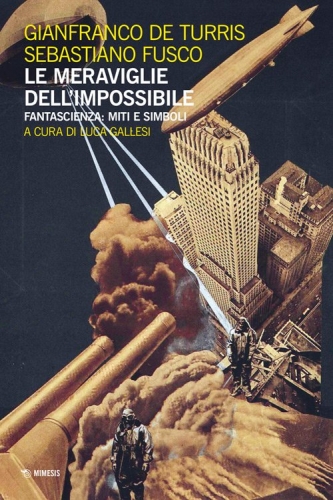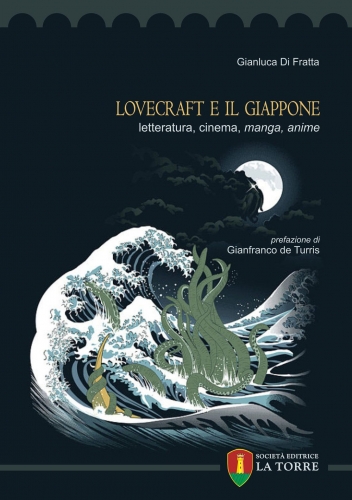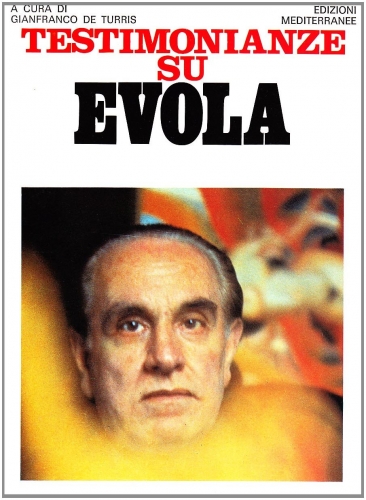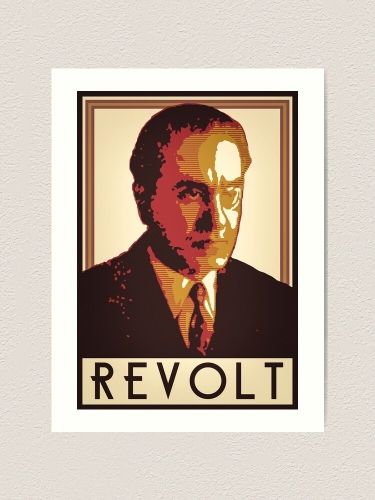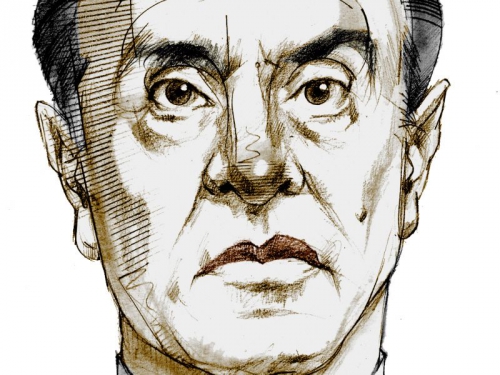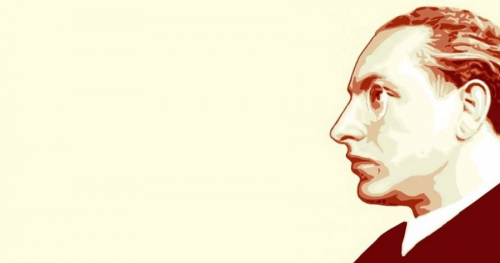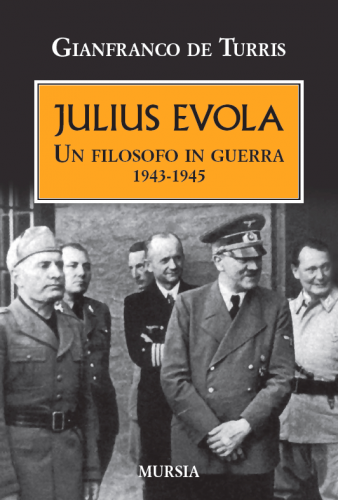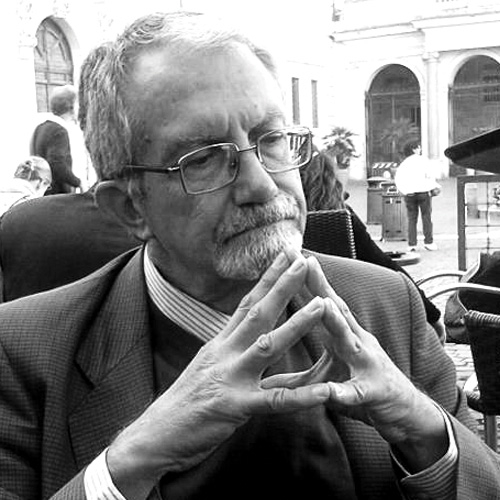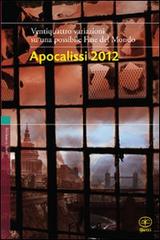ex: http://www.counter-currents.com
Gianfranco de Turris
Julius Evola: The Philosopher and Magician in War: 1943–1945
Rochester, VT: Inner Traditions, 2020
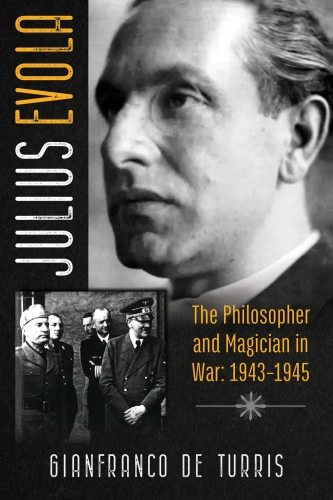 This English translation of Gianfranco de Turris’s Julius Evola: Un filosofo in guerra 1943–1945 has come along at just the right time, for it shows us how a great man coped both with societal collapse and with personal tragedy. As the title implies, the book focuses on Evola’s activities during the last two years of the Second World War. However, de Turris goes considerably beyond that time frame, dealing with much that happened to Evola after the war, up until about 1950.
This English translation of Gianfranco de Turris’s Julius Evola: Un filosofo in guerra 1943–1945 has come along at just the right time, for it shows us how a great man coped both with societal collapse and with personal tragedy. As the title implies, the book focuses on Evola’s activities during the last two years of the Second World War. However, de Turris goes considerably beyond that time frame, dealing with much that happened to Evola after the war, up until about 1950.
De Turris’s main objectives in this work are to solve a number of mysteries about Evola’s activities at the end of the war, and in the post-war years, and to respond to the philosopher’s critics. Because, until now, so little has been known about these years in Evola’s life, they have been the object of a great deal of speculation, especially on the part of hostile, Left-wing writers. De Turris has uncovered fascinating new information about Evola’s activities and provided definitive answers to a great many lingering questions.
The book begins with an episode that will doubtless be the focus of most critical reviews: Evola’s journey to Hitler’s headquarters in August–September 1943. As the war dragged on, public opinion in Italy had begun to turn against Mussolini, especially after Rome was bombed by the Allies for the first time on the 19th of July. Several members of the government had turned against Mussolini, and the Duce felt compelled to summon the Fascist Grand Council for the first time since the beginning of the war. This turned out to be a mistake, for it passed a motion of no confidence in Mussolini, effectively giving King Victor Emmanuel the power to dismiss him. Mussolini, however, behaved as if nothing of significance had occurred. He appeared for an audience at the royal palace the next day, prepared to brief the King on recent events. Instead, the King had Mussolini arrested and imprisoned in a hotel atop Gran Sasso mountain, the highest peak in the Apennines.
The story of Mussolini’s daring rescue (on the 12th of September) by German commandos flying gliders, led by the legendary Otto Skorzeny, is one of the most famous episodes of the war. Mussolini was immediately flown to Munich and then to Hitler’s HQ (“Wolf’s Lair”) in East Prussia. When he arrived on the 14th of September, Julius Evola had already been there for several days. The philosopher was part of a delegation chosen by the Germans to help advise them on what course to take in Italy. The delegation also included the Duce’s son, Vittorio.
Their journey from Italy was undertaken at considerable risk. The plane carrying Evola narrowly escaped interception by Allied aircraft. On the ground, Evola and others were disguised for part of their journey in Waffen SS caps and coats. Once the philosopher had arrived at Wolf’s Lair, he and the other members of the delegation were received by Joachim von Ribbentrop who communicated to them Hitler’s wish that “the Fascists who remained faithful to their belief and to the Duce were to immediately initiate an appeal to the Italian people announcing the constitution of a counter-government that confirmed loyalty to the Axis according to the commitment first declared and then not maintained by the King” (quoting Evola’s account, p. 20).
Believe it or not, this is one of the less interesting parts of de Turris’s book. Far more interesting is what happens to Evola later. Those already familiar with the details of Evola’s life will know what is coming: his flight from Rome, his injury in Vienna, and his long recovery in the years immediately following the war. This part of the book is more interesting not just because it fills in many blanks in Evola’s biography, but because it reveals a more “human” side to the philosopher. I apologize if this seems a somewhat maudlin way to speak of a man like Evola, but I can think of no alternative.
Those who have read Evola extensively know that the philosopher can often seem as remote as the peaks he climbed in his youth. In de Turris’s account, however, we find an Evola who is initially depressed and dispirited by the outcome of the war, and by his injury. He struggles to make sense out of why these things have occurred, and he struggles to define what his mission must be in the post-war situation. Eventually, he emerges triumphant, but it is instructive to see not only how he overcomes his struggles, but that he struggles. In facing our current situation, in which the Western world (especially the US) seems to be falling down around our ears, Evola’s example gives us strength. We see that even Evola, even this “differentiated type” (to use his terminology) had to struggle with adversity — but that he overcame.
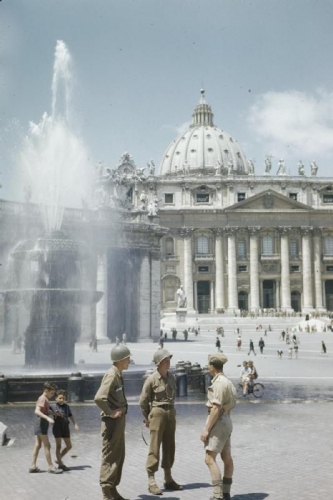
On June 4, 1944, the Allies captured Rome. One of the first things their agents did, just hours after entering the city, was to pay Julius Evola a call. Allied intelligence had learned that Evola’s name was on a list of intended agents of a German-led “Post-Occupational Network” for espionage and sabotage (his codename was “Maria”). They showed up at Evola’s apartment, no doubt with the intention of arresting and interrogating him. However, Evola’s elderly mother detained them at the entrance, while the philosopher slipped unnoticed out a side door. The one thing he took with him was a suitcase containing the materials that would eventually become the three-volume Introduction to Magic (Introduzione alla magia).
Evola then embarked on a long and arduous journey. On foot, he made his way out of the city and located the retreating German troops. They gave him shelter, and eventually, he wound up in Vienna, where he lived under an assumed name. Exactly why Evola headed for Vienna has been something of a mystery, and de Turris spends a good deal of time on it. Incredibly, it appears that Evola went to Vienna to undertake research on Freemasonry at the request of the SD (Sicherheitsdienst; the “Security Service” of the SS)! The SD’s “Office VII” had been engaged in Freemasonic studies, and they were not going to interrupt it for a small thing like the apocalypse.
Evola later told an associate that the SD had assigned him the task of “a purification work and ‘return to the origin’ of the Freemasonic rituals found during the war by the German troops in various countries” (p. 158). Evola was not sure exactly why the SD was interested in this. Had they sent him in search of the Ark of the Covenant, it would hardly be more surprising. In case it is not obvious what Freemasonry had to be “purified” of, Evola actually makes this clear in his autobiography The Path of Cinnabar (Il cammino del cinabro): “[Freemasonry] initially had an initiatic character but later, in parallel with its politicization, had moved to obey and subject itself to anti-traditional influences. The final outcome was to act out the part as one of the main secret forces of world subversion, even before the French Revolution, and then in general solidarity with the revolution of the Third State [sic]” (quoted in de Turris, p. 159; The translator means “Third Estate,” which, in the French Ancien Régime, was made up of the peasants and bourgeoisie).
 On January 21, 1945, Evola decided to take a walk through the streets of Vienna during an aerial bombardment by the Americans (and not the Soviets, as has been erroneously claimed). While he was in the vicinity of Schwarzenbergplatz, a bomb fell nearby, throwing Evola several feet and knocking him unconscious. He was found and taken to a military hospital. When the philosopher awoke hours later, the first thing he did was to ask what had become of his monocle. Once the doctors had finished looking him over, the news was not good. Evola was found to have a contusion of the spinal cord which left him with complete paralysis from the waist down. As Mircea Eliade notoriously said, the injury was roughly at the level of “the third chakra.” It resulted in Evola being categorized as a “100-percent war invalid,” which afforded him the small pension he received for the rest of his life.
On January 21, 1945, Evola decided to take a walk through the streets of Vienna during an aerial bombardment by the Americans (and not the Soviets, as has been erroneously claimed). While he was in the vicinity of Schwarzenbergplatz, a bomb fell nearby, throwing Evola several feet and knocking him unconscious. He was found and taken to a military hospital. When the philosopher awoke hours later, the first thing he did was to ask what had become of his monocle. Once the doctors had finished looking him over, the news was not good. Evola was found to have a contusion of the spinal cord which left him with complete paralysis from the waist down. As Mircea Eliade notoriously said, the injury was roughly at the level of “the third chakra.” It resulted in Evola being categorized as a “100-percent war invalid,” which afforded him the small pension he received for the rest of his life.
Why did Evola go for a walk during a bombing raid? Eliade erroneously claimed that Evola “went to fight on the barricades against the Soviet Russian advance on Vienna” (p. 128). Evola provides an answer himself, in a hitherto unpublished letter to the wife of the Austrian conservative philosopher Othmar Spann:
. . . I would always challenge destiny, so to speak. And from here originate my acts of folly on the glaciers and mountains: hence the principle of my not caring or having any concern about the aerial bombardments. And the same goes for when I was in Vienna when the situation had exacerbated to the point of severe danger. . . . In the end I was caught by a carpet bombing in Schwarzenberg. [p. 125]
But when Evola went out walking that fateful day, he had expected that his destiny would be either to live or to die. He was not expecting that he might be destined to live out the rest of his days as a cripple. This turn of events seems to have utterly perplexed the philosopher, and he struggled to make sense of why this had happened to him, and at that point in his life. Matters were complicated by Evola’s belief, stated years later in The Path of Cinnabar, that “there is no significant event in existence that was not wanted by us before birth” (quoted in de Turris, p. 169).
In the same letter to Erika Spann, Evola writes: “What is not clear to me is the purpose of the whole thing: I had in fact the idea — the belief if you want to call it, naïve — that one either dies or reawakens. The meaning of what has happened to me is one of confusion: neither one nor the other motive” (p. 170). De Turris refers to the “incomprehension and disillusionment” Evola experienced “at the outcome and aftermath of the war” (p. 54). The philosopher had been struggling to understand the cataclysm that had engulfed Europe and destroyed Fascism and National Socialism, concerning which he had cautiously nurtured certain hopes. Now, additionally, he had to make sense of why fate had chosen to permanently cripple this Western kshatriya, this man of action. It is difficult to imagine the desolation and inner turmoil Evola had to endure in the years immediately following the war. Again quoting the letter to Frau Spann: “In this world today — in this world of ruins — I have nothing to do or look for. Even if tomorrow everything magically returns to its place, I would be here without a goal in life, empty. All the more so in this condition and in this clinic” (pp. 199-200).
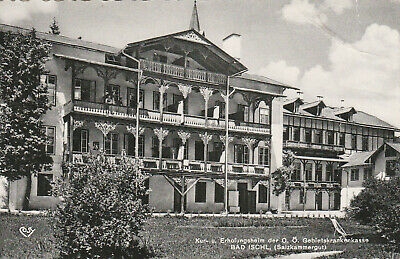 Evola was eventually transferred to a hospital in Bad Ischl, where he received better treatment. De Turris offers a rather harrowing account of the various operations and therapies used to treat Evola, mostly without success. Despite his condition, while at Bad Ischl, Evola actually traveled to Budapest, where he remained for a couple of months before returning to Austria. Little is known about what Evola was doing in Budapest or who helped him get there (though we now know the address at which he was living). De Turris argues persuasively that Evola went there to be treated by the famous Hungarian neurologist, András Pető, who had some success in the treatment of paralysis using unconventional methods. Unfortunately, he was not able to help Evola.
Evola was eventually transferred to a hospital in Bad Ischl, where he received better treatment. De Turris offers a rather harrowing account of the various operations and therapies used to treat Evola, mostly without success. Despite his condition, while at Bad Ischl, Evola actually traveled to Budapest, where he remained for a couple of months before returning to Austria. Little is known about what Evola was doing in Budapest or who helped him get there (though we now know the address at which he was living). De Turris argues persuasively that Evola went there to be treated by the famous Hungarian neurologist, András Pető, who had some success in the treatment of paralysis using unconventional methods. Unfortunately, he was not able to help Evola.
From the beginning, Evola had entertained the possibility that his paralysis was “psychic” in nature. He was encouraged in this belief by René Guénon, with whom he continued to correspond from his hospital bed in Bad Ischl. Guénon wrote to him:
According to what you tell me, it would seem that what really prevents you from recovering is more of a psychic nature than physical; if this is so the only solution without doubt would be to provoke a contrary reaction that comes forth from your own self. . . . Besides, it isn’t at all impossible that something might have taken advantage of the opportunity provided by the lesion to act against you; but it’s not at all clear by whom and why this may have occurred. [p. 148]
In fact, there does seem to be something mysterious about Evola’s condition. In 1952, he was visited in his apartment by several associates, including the anthroposophists Massimo Scaligero and Giovanni Colazza. During this visit, the men saw Evola move his legs – something that, given his paralysis, should have been completely impossible. After leaving Evola’s presence, they were naturally eager to discuss this. It was reported that Colazza said to Scaligero, “Of course he could! But he doesn’t! He does not want to do it” (p. 197).
Setting this mystery aside, Evola appears to have become reconciled to his condition by reminding himself that, after all, the body is but a temporary vehicle for the spirit. In a letter to a friend, he states that “in regard to my situation — even if I had to remain forever like this, which is not excluded — it spiritually does not signify anything more for me than if my car had a flat tire” (p. 168). Another friend, a Catholic priest, naïvely suggested that Evola travel to Lourdes in hopes of a miracle cure at the Sanctuary of our Lady. Evola responded with kindness and patience, saying, “I have already told you how little this thing means to me . . . The basic premise, which is that of an ardent desire for a healing, is first of all lacking. If grace were to be asked for, it would rather be to understand the spiritual meaning as to why this has happened — whether it remains this way or not; even more so, to understand the reason for my continuing to live” (pp. 168-69).
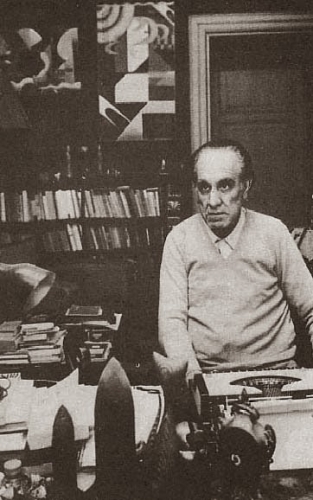 And, in time, Evola does seem to have come to some understanding of why fate had dealt him this hand, though he never made public these very personal reflections. On the eve of the philosopher’s return to Italy in August 1948, his doctor at Bad Ischl reported that “the general state of the patient has improved considerably in these last days, the initial depressions have become lighter, the irascibility and the problems of relationship with the nursing staff and patients have declined markedly” (p. 176). Indeed, one imagines that Evola was not an ideal patient. He wrote to Erika Spann of the “spirit-infested atmosphere of the diseases of these patients” (p. 193; italics in original).
And, in time, Evola does seem to have come to some understanding of why fate had dealt him this hand, though he never made public these very personal reflections. On the eve of the philosopher’s return to Italy in August 1948, his doctor at Bad Ischl reported that “the general state of the patient has improved considerably in these last days, the initial depressions have become lighter, the irascibility and the problems of relationship with the nursing staff and patients have declined markedly” (p. 176). Indeed, one imagines that Evola was not an ideal patient. He wrote to Erika Spann of the “spirit-infested atmosphere of the diseases of these patients” (p. 193; italics in original).
What undoubtedly lifted Evola’s spirits is that he had at last defined what was to be his post-war mission. In The Path of Cinnabar, he writes that
The movement in the post-war period should have taken the form of a party and performed a function analogous to that which the Italian Social Movement [MSI] had conceived for itself, but with a more precise traditional orientation, belonging to the Right, without unilateral references to Fascism and with a precise discrimination between the positive aspects of Fascism and the negative ones. [Quoted in de Turris, p. 54]
Concerning this, de Turris comments that “all of his [post-war] publishing activities and book-writing projects were specifically oriented in this direction” (p. 54). In 1949, Evola began writing again, initially under the penname “Arthos.” He wrote in bed, in pencil, with a lap desk placed before him, or he used a typewriter, seated at his desk in front of the window. His French biographer, Jean-Paul Lippi, referred to him as “an immobile warrior.”
Around this time, Evola learned that he had become an idol of Right-wing youth in Italy. In September 1950, he addressed the National Youth Assembly of the MSI in Bologna. The inclusion of Evola seems to have been last-minute. The organizers heard that the philosopher was staying at a nearby hospital and paid him an impromptu visit. One of the men present offers this moving account of what happened next:
We introduced ourselves and invited him to attend the assembly. He made himself immediately available and expressed great interest. He asked us if he could have the time only to change and shave. I remember that in his haste he had a small cut on his cheek. We carried him in our arms and placed him in the German military truck. Upon entering the assembly hall he was warmly welcomed by our group and since Evola was unknown to me as a thinker, Enzo Erra introduced him as a heroic invalid of the Italian Social Republic. On stage, while I was supporting him, I noticed that he was pleasantly surprised and moved by the welcome of hundreds of young people. He silently fixed his attention and listened intently to the various interventions, and at the end of the proceedings we took him back to the hospital. It was at that moment that we had the idea of asking him to write a booklet that would be a guide, and that was how the Orientamenti was born. The next day we accompanied him to a small mountain hotel in the Apennines. [p. 207]
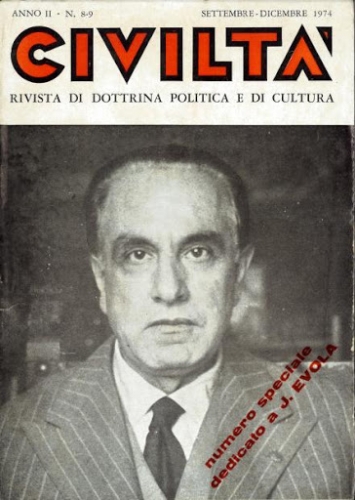 Julius Evola was back. Indeed, he wrote some of his most important books in the post-war years: Men Among the Ruins, The Metaphysics of Sex, Ride the Tiger, The Path of Cinnabar, Meditations on the Peaks, and others. Arguably, he enjoyed far more influence after the war than he ever did before. Disturbed by his influence on the youth, Italian authorities arrested Evola in May 1951 and put him on trial for “glorifying Fascism.” He was acquitted — something that would be unimaginable in today’s world, given its unironic concern with “social justice.”
Julius Evola was back. Indeed, he wrote some of his most important books in the post-war years: Men Among the Ruins, The Metaphysics of Sex, Ride the Tiger, The Path of Cinnabar, Meditations on the Peaks, and others. Arguably, he enjoyed far more influence after the war than he ever did before. Disturbed by his influence on the youth, Italian authorities arrested Evola in May 1951 and put him on trial for “glorifying Fascism.” He was acquitted — something that would be unimaginable in today’s world, given its unironic concern with “social justice.”
This book is required reading for admirers of Evola, and students of traditionalism generally. It should also be read by Leftist critics of Evola — though it will not be, or, if it is, the contents will be distorted and misrepresented. You see, de Turris does almost too thorough a job of demolishing Evola’s detractors. One wishes, in fact, that he had spent a little less time jousting with these people, as they all come off as dishonest lightweights. Still, I suppose it is necessary. And “jousting” is an appropriate term, as de Turris’s defense of his mentor is gallant and virile in the best tradition of the “aristocrats of the soul.” He has learned from a master, and in his voice we sometimes hear an echo of Evola’s own. De Turris is well-qualified to tell Evola’s story: he knew the philosopher personally, and is the executor of his estate.
Among the fine features of this volume are two interesting appendices. The first consists of illustrations, some of which are fascinating. One is a reproduction of the top of a cigar box signed by the men present at Wolf’s Lair, including Evola, Vittorio Mussolini, and others. The second appendix consists of hitherto-unpublished translations of several articles Evola wrote in 1943 for La Stampa, the daily newspaper in Turin. I will close with a quote from one of these, which is not only prescient, given Evola’s fate after 1943, but also particularly relevant to the situation in which we now find ourselves:
From one day to another, and even from one hour to another, an individual can lose his home to a bombardment: that which has been loved the most and to which one was most attached, the very object of one’s most spontaneous feelings. . . . It has become blatantly clear . . . as a living fact accompanied with a feeling of liberation: all that is destructive and tragic can have value to inspire. This is not about sensitivity or badly understood Stoicism. Quite the contrary: it is a question of knowing and nurturing a sense of detachment from oneself, people, and things, which should instill calm, unparalleled security, and even . . . indomitability. . . . A radical breakdown of the “bourgeois” that exists in every person is possible in these devastating times. . . . [To] make once more essential and important what should always be in a normal existence: the relationship between life and more than life . . . During these hours of trials and tribulations the discovery of the path, where these values are positively experienced and translated into pure strength for as many people as possible, is undoubtedly one of the main tasks of the political-spiritual elite of our nation. [pp. 261–62]
If you want to support our work, please send us a donation by going to our Entropy page [3] and selecting “send paid chat.” Entropy allows you to donate any amount from $3 and up. All comments will be read and discussed in the next episode of Counter-Currents Radio, which airs every Friday.
Don’t forget to sign up [4] for the twice-monthly email Counter-Currents Newsletter for exclusive content, offers, and news.



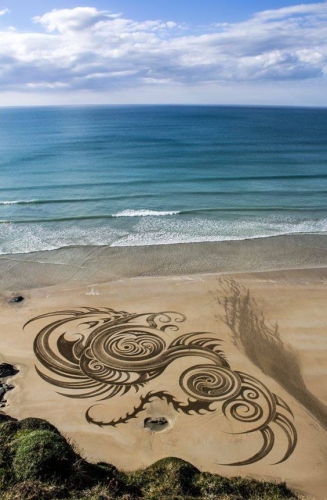
 Si seulement la droite fluide au pouvoir avait un minimum d'intérêt pour la culture. Ce qui n'a rien à voir avec les noms de ceux qui ont accepté de baiser la pantoufle sacrée pour obtenir un poste rémunéré quelque part.
Si seulement la droite fluide au pouvoir avait un minimum d'intérêt pour la culture. Ce qui n'a rien à voir avec les noms de ceux qui ont accepté de baiser la pantoufle sacrée pour obtenir un poste rémunéré quelque part.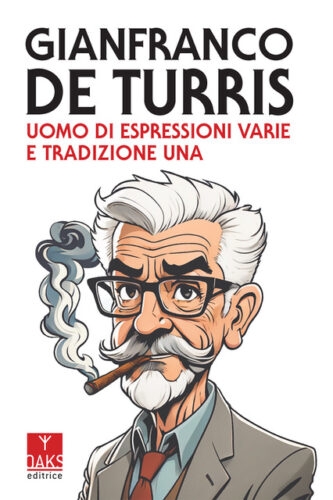 Alors qu'en parcourant les notices biographiques de ceux qui ont participé à la réalisation de Gianfranco de Turris, homme d'expressions diverses et de tradition (Oaks editrice), on découvre que la "culture non-conformiste et la connaissance des frontières" sont représentées, depuis des décennies, par des intellectuels qui ont eu des carrières professionnelles plus que satisfaisantes dans leurs domaines respectifs. Sans qu'il soit nécessaire d'inventer des alibis de discrimination pour leurs idées politiques jamais dissimulées.
Alors qu'en parcourant les notices biographiques de ceux qui ont participé à la réalisation de Gianfranco de Turris, homme d'expressions diverses et de tradition (Oaks editrice), on découvre que la "culture non-conformiste et la connaissance des frontières" sont représentées, depuis des décennies, par des intellectuels qui ont eu des carrières professionnelles plus que satisfaisantes dans leurs domaines respectifs. Sans qu'il soit nécessaire d'inventer des alibis de discrimination pour leurs idées politiques jamais dissimulées.
 del.icio.us
del.icio.us
 Digg
Digg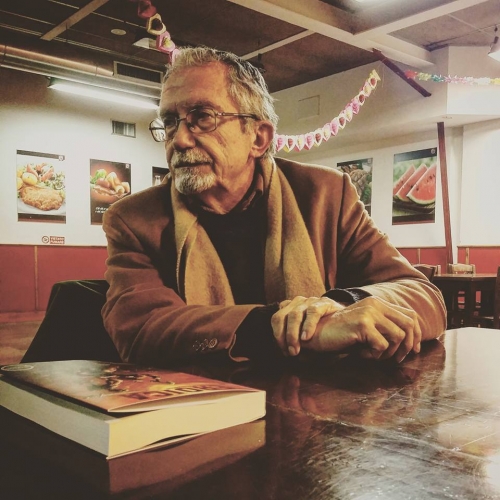
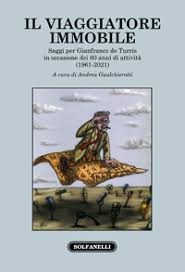 Le livre est un recueil de contributions d'amis, de collaborateurs et de collègues, enrichi d'une célèbre contribution critique de Gianfranco de Turris lui-même, Dal Mito alla Fantasy (Du mythe à la littérature fantastique), et d'une bibliographie de ses œuvres de fiction. Il ne s'agit pas d'une célébration sans critique, d'un ouvrage simplement hagiographique et panégyrique dans un sens dissuasif, mais, comme le souligne l'éditeur, "d'un hommage bien mérité qui a d'autant plus de valeur que celui qui le reçoit se bat encore sur le terrain" (p. 8). Le livre rassemble différentes contributions, certaines basées sur des souvenirs, d'autres visant à présenter un portrait psychologique, humain et existentiel de de Turris. On y trouve aussi, bien sûr, des analyses importantes de ses contributions sur l'œuvre de Tolkien, Lovecraft, Meyrink, Machen et la littérature de science-fiction. Sebastiano Fusco, qui, en tant que jumeau littéraire, a accompagné presque entièrement notre activité éditoriale, se souvient que tout est né à Rome, au début des mémorables années soixante, une période de grands changements sociaux, caractérisée par une nouvelle ferveur intellectuelle. Roberto Scaramuzza, qui deviendra plus tard le rédacteur en chef du légendaire magazine Abstracta, met de Turris et Fusco en contact. Tous trois vivaient dans le même quartier et c'est là qu'ils ont également rencontré Luigi de Pascalis. Une fraternité est née et s'est poursuivie au fil des ans.
Le livre est un recueil de contributions d'amis, de collaborateurs et de collègues, enrichi d'une célèbre contribution critique de Gianfranco de Turris lui-même, Dal Mito alla Fantasy (Du mythe à la littérature fantastique), et d'une bibliographie de ses œuvres de fiction. Il ne s'agit pas d'une célébration sans critique, d'un ouvrage simplement hagiographique et panégyrique dans un sens dissuasif, mais, comme le souligne l'éditeur, "d'un hommage bien mérité qui a d'autant plus de valeur que celui qui le reçoit se bat encore sur le terrain" (p. 8). Le livre rassemble différentes contributions, certaines basées sur des souvenirs, d'autres visant à présenter un portrait psychologique, humain et existentiel de de Turris. On y trouve aussi, bien sûr, des analyses importantes de ses contributions sur l'œuvre de Tolkien, Lovecraft, Meyrink, Machen et la littérature de science-fiction. Sebastiano Fusco, qui, en tant que jumeau littéraire, a accompagné presque entièrement notre activité éditoriale, se souvient que tout est né à Rome, au début des mémorables années soixante, une période de grands changements sociaux, caractérisée par une nouvelle ferveur intellectuelle. Roberto Scaramuzza, qui deviendra plus tard le rédacteur en chef du légendaire magazine Abstracta, met de Turris et Fusco en contact. Tous trois vivaient dans le même quartier et c'est là qu'ils ont également rencontré Luigi de Pascalis. Une fraternité est née et s'est poursuivie au fil des ans.